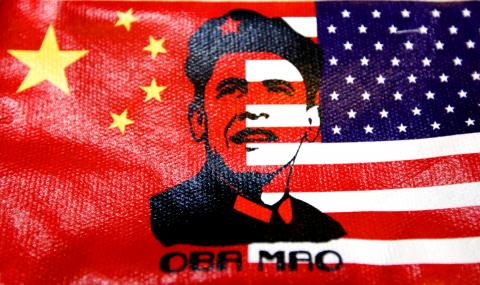Washington was anxiously awaiting the arrival of Chinese President Hu Jintao (胡錦濤) yesterday for a state visit that may be long on pomp and ceremony, but short on achievement and substance.
Top officials are adamant that the US will continue to sell arms to Taipei no matter what proposals Hu makes.
Even though Hu will be honored with a 21-gun salute and a black-tie White House dinner, US President Barack Obama and his closest aides remain unsure and suspicious of Chinese intentions and motivations.

Photo: REUTERS
Within the administration, there is even doubt about just how much internal power Hu really has.
It is being widely reported in US media that Hu may be the weakest leader of the Chinese Communist Party era.
According to the New York Times, Obama’s advisers have concluded that Hu “is often at the mercy of a diffuse ruling party in which generals, ministers and big corporate interests have more clout, and less deference, than they did in the days of Mao [Zedong (毛澤東)] or Deng Xiaoping (鄧小平).”
“Years of waiting for China to play a more constructive role have given way to the realization that American and Chinese national interests may simply be too divergent for the two to create a meaningful partnership,” American Enterprise Institute academic Michael Auslin said.
Meanwhile, the Washington Post forecast: “The Obama administration plans to use the summit to refocus attention on China’s record on human rights and political freedoms after spending much of the past two years seeking to engage the Chinese leadership on a broad array of global issues, including climate change, helping stabilize the global economy and dealing with the nuclear ambitions of Iran and North Korea.”
The biggest announcement to come out of the visit could involve new contracts for Beijing to buy tens of billions of US dollars in US goods, including civilian aircraft.
During his last visit in 2006, a Falun Gong protester broke through a security cordon to heckle Hu and an interpreter announced the Chinese national anthem as that of the “Republic of China,” the official name of Taiwan.
The White House is determined that there will be no such snafus this time.
During that first visit, Hu also spoke at some length about Taiwan and there is considerable interest in whether he will do that again.
It has been widely reported that in his answers to written questions from the Wall Street Journal and the Washington Post — published this week — Hu did not mention Taiwan.
The Washington Post said on Monday that the consensus among China watchers was that the chances of Obama and Hu finding a resolution to such sensitive issues as the Chinese currency, North Korea or Taiwan were unlikely.
Hu is expected to press the US to ease its ban on technology exports and seek assurances that US markets will remain open to Chinese goods.
Bonnie Glaser, an academic with the Center for Strategic and International Studies, has told the Washington Post that the Obama administration would like some “concrete deliverables” to demonstrate that the president’s China policy is effective and producing results.
She said that at the end of the summit, a statement might be issued that “reaffirms both leaders’ commitment to promoting a positive, cooperative and comprehensive bilateral relationship and to working together on a vast agenda of issues.”

US climber Alex Honnold is to attempt to scale Taipei 101 without a rope and harness in a live Netflix special on Jan. 24, the streaming platform announced on Wednesday. Accounting for the time difference, the two-hour broadcast of Honnold’s climb, called Skyscraper Live, is to air on Jan. 23 in the US, Netflix said in a statement. Honnold, 40, was the first person ever to free solo climb the 900m El Capitan rock formation in Yosemite National Park — a feat that was recorded and later made into the 2018 documentary film Free Solo. Netflix previewed Skyscraper Live in October, after videos

Starting on Jan. 1, YouBike riders must have insurance to use the service, and a six-month trial of NT$5 coupons under certain conditions would be implemented to balance bike shortages, a joint statement from transportation departments across Taipei, New Taipei City and Taoyuan announced yesterday. The rental bike system operator said that coupons would be offered to riders to rent bikes from full stations, for riders who take out an electric-assisted bike from a full station, and for riders who return a bike to an empty station. All riders with YouBike accounts are automatically eligible for the program, and each membership account

NUMBERS IMBALANCE: More than 4 million Taiwanese have visited China this year, while only about half a million Chinese have visited here Beijing has yet to respond to Taiwan’s requests for negotiation over matters related to the recovery of cross-strait tourism, the Tourism Administration said yesterday. Taiwan’s tourism authority issued the statement after Chinese-language daily the China Times reported yesterday that the government’s policy of banning group tours to China does not stop Taiwanese from visiting the country. As of October, more than 4.2 million had traveled to China this year, exceeding last year. Beijing estimated the number of Taiwanese tourists in China could reach 4.5 million this year. By contrast, only 500,000 Chinese tourists are expected in Taiwan, the report said. The report

Temperatures are forecast to drop steadily as a continental cold air mass moves across Taiwan, with some areas also likely to see heavy rainfall, the Central Weather Administration (CWA) said. From today through early tomorrow, a cold air mass would keep temperatures low across central and northern Taiwan, and the eastern half of Taiwan proper, with isolated brief showers forecast along Keelung’s north coast, Taipei and New Taipei City’s mountainous areas and eastern Taiwan, it said. Lows of 11°C to 15°C are forecast in central and northern Taiwan, Yilan County, and the outlying Kinmen and Lienchiang (Matsu) counties, and 14°C to 17°C